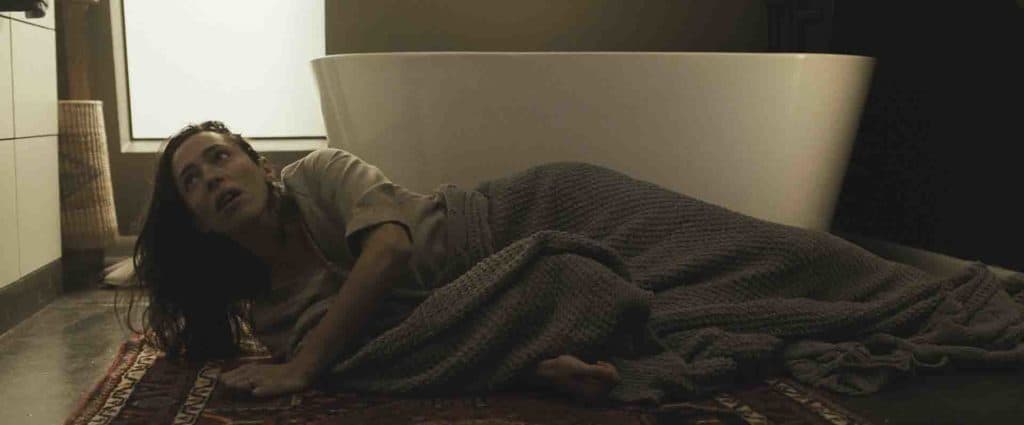Moviegoer: The Night House

How well can you ever know the ones you love?
By Diana Beechener
A few days before the end of the school year, Beth’s (Rebecca Hall: Godzilla vs Kong) husband Owen leaves their palatial lake house, rows himself to the center of the lake, and kills himself. He leaves a cryptic note but no other clues as to why he’d do such a thing.
Beth is numb. She forces herself to go back to her teaching job the day after the funeral. She tells everyone who asks that she’s fine. And she is…during the day.
At night her home becomes something of a prison. She drinks brandy that she doesn’t like, she resentfully watches home movies, and falls asleep wondering why her wonderful husband did what he did. She’s consumed by guilt and grief, with no real outlet for either. That’s when the visits start.
They are small at first—a knock in the night, the stereo turning on by itself, a text message from Owen’s phone that isn’t there in the morning. But as Beth’s nightly apparition becomes more aggressive, she begins to wonder if her husband is still with her. Desperate to understand why he’d take his life, Beth tries to contact Owen. When that fails, she starts digging through his phone and computer, looking for clues.
What she finds leads Beth to wonder who exactly she was married to, and what Owen still wants to tell her.
The Night House isn’t the first horror film to deal with grief and guilt over the loss of a loved one, but it offers a unique take on the trope. Beth is haunted both figuratively and possibly literally by the shocking death of her husband, and those around her chalk up her strange experiences to grief. Director David Bruckner (The Ritual) spends loads of time setting the scene for us. It’s time well spent, as he crafts a creepy, tense atmosphere. There are plenty of visual tricks he lays in his frames, each filled with items that could be something lying in wait, or just some flotsam in a corner. You’re never sure, and that keeps you wonderfully on edge as Beth investigates the house.
Bruckner is also good at playing with sound. Whether for a jump scare or just an unnerving noise in the background of a scene, The Night House draws a great deal of tension from its audio track. Bruckner uses the inherent creepiness of being home alone to his full advantage –—with each noise echoing through the home a possible ghost, or simply the house settling.
The biggest asset to the film, however, is undoubtedly Hall’s performance. She takes a ferocious approach to her portrayal of Beth, who’s all hard edges and sharp wit. Beth doesn’t mind using her husband’s death to make an overbearing parent uncomfortable, nor is she willing to dismiss everything she’s experiencing as grief. This sort of formidable personality makes Beth’s emotional moments even more poignant. When she breaks down at the end of a bad day, it feels momentous, all of her defenses eroding in the face of overwhelming grief.
Though Hall is a wonder and the visuals are spooky, The Night House is a film without an ending. The last act of the movie has a lot of big concepts it wants to play with, but none are teased out in a satisfying way. It never comes near the heights of other horror movies reflecting on guilt and grief (think The Relic, The Babadook, or Hereditary), but it certainly has similar aspirations. This may be a case of too much all at once, but it leaves what is a genuinely great setup a bit flat upon landing.
In spite of a messy final act, The Night House is an enjoyably tense rumination on the effects of grief and loss. Bolstered by Hall’s magnificent performance and some crafty filmmaking techniques, the movie is certainly worth a watch—go out for dinner after and debate what you think the ending means.
Good Horror * R * 108 mins.
